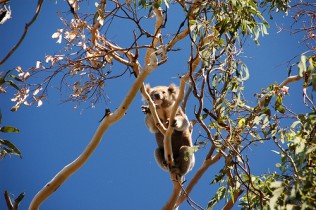
One of Australia’s iconic creatures, the koala is beloved around the world, yet if current trends continue, a day may come when this cuddly marsupial may be no more than a memory. The koala is facing extreme threat from habitat destruction, attacks by domestic and feral dogs, road accidents, climate change, and other factors. According to the Guardian, an estimated 4,000 koalas are killed by dogs and cars alone each year. Global warming also poses a risk for the survival of koalas, which are highly susceptible to dehydration and heat stress. Climate change also increases the risk of droughts and bushfires that destroy koala habitat.
Recently, a shocking documentary report by the Australian Broadcasting Corporation brought to light yet another threat to koalas: timber harvesting on blue gum tree plantations. As their natural habitat has been destroyed, many koalas have sought refuge on these large plantations, but as the trees are harvested, the animals are being killed and seriously injured in the process. In addition to dead koalas, wildlife volunteers have seen animals with broken and severed limbs, impact wounds, and broken backs from encounters with logging equipment and falling out of trees as they are felled. The deaths of mother koalas has left joeys, as young koalas are known, struggling to survive, many with their own injuries.
Loggers working for the timber companies were the ones to bring this issue to light, most of them preferring to remain anonymous to protect their jobs. Asked how often he saw koalas that had been hurt in the timber harvesting, one whistleblower told ABC’s reporter, “It was like a daily thing. Sometimes a couple every hour, sometimes just one a day.You normally come across them on the ground, dead or pretty badly injured.”

Only rarely are wildlife rescuers called in to help, but when they are, there is nothing they can do for some injured koalas except put them out of their misery. Jill Rowley of Mount Gambier, South Australia, told ABC about one location where 21 koalas were killed—she herself had to euthanize 14 of them.
For koalas on tree plantations, one problem is that the government has relied on the timber industry to be self-policing. Andrew Pritchard, program manager of terrestrial biodiversity at Victoria’s Department of Environment and Primary Industries, told ABC that his department does some on-the-ground assessments with the timber industry, but there are no random checks to ensure that koalas are being protected, and no monitors on the ground to make sure there are no koalas in the trees that are being felled and passed through shredders and other equipment.
“No one is taking full responsibility for the koala. It’s a native icon but everyone is saying it’s someone else’s job,” Deborah Tabart, chief executive of the Australian Koala Foundation (AKF), told the Guardian. “The government has allowed industry to completely self-regulate. We need a new koala protection act that says you simply can’t touch a tree where a koala lives.”
In April 2012, the federal government officially designated koalas in the states of Queensland and New South Wales (NSW), as well as in the Australian Capital Territory, as threatened. The Queensland population has declined by as much as 40 percent over the past two decades, while NSW has seen a one-third decrease in its koala population over the same time period. Koalas also live in Victoria and South Australia, where they face serious issues but are not yet federally designated as threatened. According to the AKF (cited by the Guardian), there are between 45,000 and 90,000 koalas left in the wild.
How You Can Help:
1. Add your signature to Rainforest Rescue’s petition urging the regulation of logging companies and greater protection for koalas overall.
2. Support the efforts of the Australian Koala Foundation by adopting a koala, planting a koala food tree, or participating in other fundraising programs.
Read Ethical Traveler's Reprint Policy.
